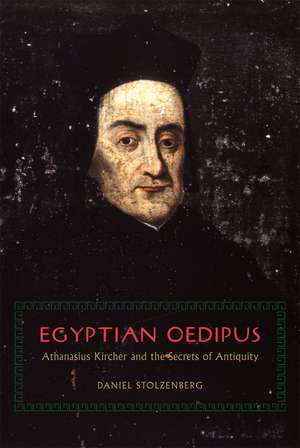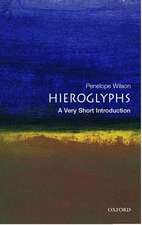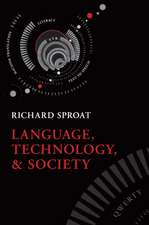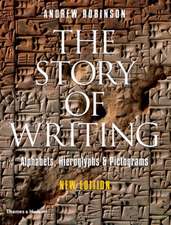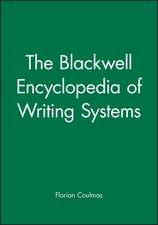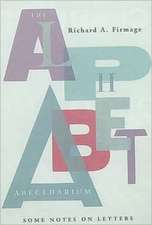Egyptian Oedipus: Athanasius Kircher and the Secrets of Antiquity
Autor Daniel Stolzenbergen Limba Engleză Paperback – 22 mai 2015
A contemporary of Descartes and Newton, Athanasius Kircher, S. J. (1601/2–80), was one of Europe’s most inventive and versatile scholars in the baroque era. He published more than thirty works in fields as diverse as astronomy, magnetism, cryptology, numerology, geology, and music. But Kircher is most famous—or infamous—for his quixotic attempt to decipher the Egyptian hieroglyphs and reconstruct the ancient traditions they encoded. In 1655, after more than two decades of toil, Kircher published his solution to the hieroglyphs, Oedipus Aegyptiacus, a work that has been called “one of the most learned monstrosities of all times.” Here Daniel Stolzenberg presents a new interpretation of Kircher’s hieroglyphic studies, placing them in the context of seventeenth-century scholarship on paganism and Oriental languages.
Situating Kircher in the social world of baroque Rome, with its scholars, artists, patrons, and censors, Stolzenberg shows how Kircher’s study of ancient paganism depended on the circulation of texts, artifacts, and people between Christian and Islamic civilizations. Along with other participants in the rise of Oriental studies, Kircher aimed to revolutionize the study of the past by mastering Near Eastern languages and recovering ancient manuscripts hidden away in the legendary libraries of Cairo and Damascus. The spectacular flaws of his scholarship have fostered an image of Kircher as an eccentric anachronism, a throwback to the Renaissance hermetic tradition. Stolzenberg argues against this view, showing how Kircher embodied essential tensions of a pivotal phase in European intellectual history, when pre-Enlightenment scholars pioneered modern empirical methods of studying the past while still working within traditional frameworks, such as biblical history and beliefs about magic and esoteric wisdom.
Preț: 242.60 lei
Nou
Puncte Express: 364
Preț estimativ în valută:
46.42€ • 48.47$ • 38.42£
46.42€ • 48.47$ • 38.42£
Carte tipărită la comandă
Livrare economică 05-19 aprilie
Preluare comenzi: 021 569.72.76
Specificații
ISBN-13: 9780226273273
ISBN-10: 022627327X
Pagini: 320
Ilustrații: 42 halftones
Dimensiuni: 152 x 229 x 23 mm
Greutate: 0.43 kg
Editura: University of Chicago Press
Colecția University of Chicago Press
ISBN-10: 022627327X
Pagini: 320
Ilustrații: 42 halftones
Dimensiuni: 152 x 229 x 23 mm
Greutate: 0.43 kg
Editura: University of Chicago Press
Colecția University of Chicago Press
Notă biografică
Daniel Stolzenberg is associate professor of history at the University of California, Davis.
Cuprins
Note on Quotations and Translations
Abbreviations
Introduction: Oedipus in Exile
1. Esoteric Antiquarianism
2. How to Get Ahead in the Republic of Letters
3. Oedipus in Rome
4. Ancient Theology and the Antiquarian
5. The Discovery of Oriental Antiquity
6. Erudition and Censorship
7. Symbolic Wisdom in an Age of Criticism
8. Oedipus at Large
Epilogue: The Twilight of Tradition and the Clear Light of History
Acknowledgments
Notes
Bibliography
Index
Abbreviations
Introduction: Oedipus in Exile
1. Esoteric Antiquarianism
2. How to Get Ahead in the Republic of Letters
3. Oedipus in Rome
4. Ancient Theology and the Antiquarian
5. The Discovery of Oriental Antiquity
6. Erudition and Censorship
7. Symbolic Wisdom in an Age of Criticism
8. Oedipus at Large
Epilogue: The Twilight of Tradition and the Clear Light of History
Acknowledgments
Notes
Bibliography
Index
Recenzii
“Extraordinary: Kircher, the figure of fun, emerges from Stolzenberg’s impressive analysis as a serious scholar. . . . The roots of Kircher’s brilliant failure as a scholar lay in his effort to pursue two incompatible paths at the same time. The mystical antiquarian could not be true to both his selves: he was a living oxymoron. It is the measure of Stolzenberg’s achievement that he makes us feel the passion and understand the arguments that led Kircher to try.”
“Thoroughly researched and informative.”
"Not only an important addition to this literature, but also deserves to be read by anyone interested in the encyclopedic and antiquarian scholarship which characterized much of the early seventeenth century republic of letters."
"Stolzenberg has succeeded admirably in showing us that Kircher's work on ancient Egypt must be taken seriously in order to understand him and his times."
“A fine study of Kircher’s Egyptological writings and the world of scholarship in the second half of the seventeenth century. Recommended.”
“If you don't already know about Athanasius Kircher, you should take a long trip through his extraordinary and weird fields of research: a Jesuit priest who tinkered with everything from early cinematic projectors to talking statues, and wrote about impossibly tall skyscrapers inspired by the Tower of Babel and developed his own unique twist on a volcanic theory of a Hollow Earth. If Gizmodo had been founded in the seventeenth century, Kircher would have been its editor in chief. Stolzenberg's book is an excellent biography of the man and his ideas.”
"A landmark study. . . . There is much that is new in this insightful and scrupulously researched book, whose most notable contributions would appear to be the restoration of Kircher's place in the intellectual and antiquarian culture of his own day, with due consideration of the subsequent reception, and rejection, of his work during the following century. Especially notable is Stolzenberg's characterization Kircher's Egyptological project as the product of 'an encounter between two early modern intellectual traditions: erudition (antiquarian research and philology) and occult philosophy (the Renaissance Neoplatonic tradition, based on a lineage of esoteric wisdom attributed to extremely ancient wise men).'"
“Daniel Stolzenberg’s beautifully conceived, meticulously researched, and eminently readable study of Athanasius Kircher is bound to become an indispensable reference for anybody interested in the momentous seventeenth-century transition from traditional occult philosophy and its belief in an ancient oriental wisdom to modern perspectives grounded in critical philological and historiographical methods.”
“Daniel Stolzenberg has a sure grasp of Athanasius Kircher’s infinite output, intricate thought, and complicated times. An informed and sensitive treatment of a truly baroque character.”
“In Egyptian Oedipus, Daniel Stolzenberg not only provides the first serious study of Athanasius Kircher’s investigations into the history and culture of ancient Egypt, but he also furnishes a perceptive critical evaluation of Kircher’s scholarship and persona, warts and all. Stolzenberg goes beyond Kircher’s programmatic statements to unveil his actual scholarly practices. In doing so, Stolzenberg has produced an exemplary case study of a polymath at work and has provided us with a more nuanced understanding of Kircher’s influence.”
“In this lively and erudite book, Daniel Stolzenberg sets himself the daunting task of making Athanasius Kircher legible to a modern reader. How, he asks, can we understand a writer like Kircher without making him a figure either of comedy or of awe? The answer he gives is a tour-de-force reading of Kircher’s central claim to fame in the seventeenth century, his work on hieroglyphics. Along the way, we learn much about the fate and function of occult philosophy in the period, the operations of the early modern republic of letters, and the place of Rome and early modern Catholicism more generally in the intellectual landscape of early modern Europe.”
